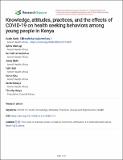Knowledge, Attitudes, Practices, and the Effects of COVID-19 on Health Seeking Behaviors Among Young People in Kenya
View/
Publication Date
2020-06-17Type
Videoviews
downloads
Metadata
Show full item recordCitation
Karijo, Evalin & Wamugi, Sylvia & Lemanyishoe, Samuel & Njuki, Jenny & Boit, Faith & Kibui, Vania & Karanja, Sarah & Abuya, Timothy. (2020). Knowledge, attitudes, practices, and the effects of COVID-19 on health seeking behaviors among young people in Kenya. 10.21203/rs.3.rs-34861/v1.
Abstract/
Background: The cases of Corona Virus Disease of 2019 (COVID-19) in Kenya have been increasing rapidly, since the rst case was conrmed in early March, 2020. In the wake of the crisis around COVID- 19, the health and socio-economic challenges experienced by Kenya’s largest demography, the youth, are likely to elevated. This study sought to establish knowledge levels, gaps and attitude of the youth with regards to COVID-19 and identify the effects of the pandemic on health seeking behaviour and socioeconomic status of youth. Methods: A cross sectional descriptive study was conducted among 2,153 youth across 47 counties in Kenya, through a combined online survey and phone interviews. All survey responses analyzed using STATA v15 were tabulated by gender, age, education level to generate basic descriptive tables and tested for differences by category using chi-square tests with a signicance level of 0.05. Where applicable linear and logistic regression analysis model was conducted with covariates such as employment status, gender and education level were used. Results: Knowledge on symptoms of COVID-19 was generally high. Female respondents were more likely to name more symptoms correctly compared to men; p<0.001. However, youth reported very low levels of anyone being at risk of infection (7%). Since they started receiving messaging on COVID-19, most youth have adopted behavior necessary to slow down the infection. There were generally very low reported levels of inability to access health services related to sexual and reproductive health. About 50% of respondents reported signicant decline in income during the pandemic period, while nearly a third reported living in fear while 27% reported feeling stressed. Conclusion: Our study revealed considerably high knowledge of COVID-19 symptoms, preventive strategies and most commonly sources of information that are instructive for the pandemic response. Findings suggest messaging campaigns should focus on reaching clarifying risk groups. The need to track health service use among youth is essential to lay longer term strategies towards minimizing potential long-term consequences of the pandemic. Strategies to sustain behaviors positively adopted and leverage the vast network of youth as champions of behavior change will be critical to reduce the spread of COVID-19.
Subject/
Corona Virus Disease; Socio-economic challenges; Pandemic; Knowledge; Sexual and reproductive health (SRH); Preventive strategies; Behaviors; Coronaviruses; Respiratory viruses; Middle-East Respiratory Syndrome (MERS); Severe Acute Respiratory Syndrome (SARS)
Further Details
This work is licensed under a Creative Commons Attribution 4.0 International License. Read Full License
Publisher
Research SquareCollections
- General - GEN [367]

